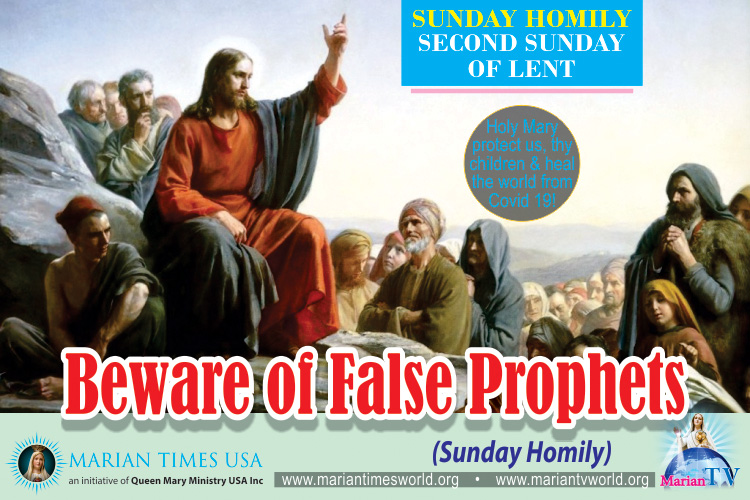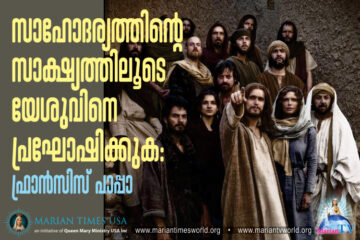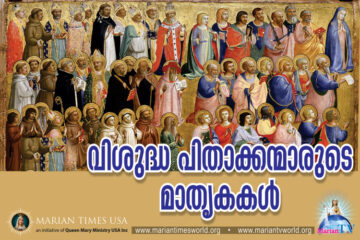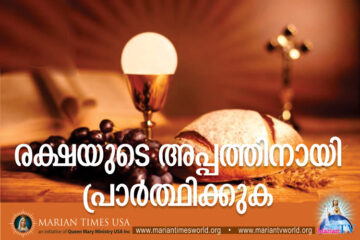BEWARE OF FALSE PROPHETS (SUNDAY HOMILY)


~ Fr. Abraham Mutholath ~
Chicago, USA. ~
SUNDAY HOMILY: SECOND SUNDAY OF LENT
INTRODUCTION
Jesus promoted a transition from ritualistic religion to a service oriented one. He wanted that the Christians transform what they hear from the Bible to the service of fellow humans as representatives of Jesus. His disciples should be recognized from the fruits of their Christian living. Pretense of people as disciples of Jesus and their misguidance of others shall be punished. Christians should be cautious of such false religious leaders. Christ is the rock on which our faith shall be based so that we will stay firm with him during times of tribulations and worldly temptations that challenge our faithfulness to God.
Bible Text: Mathew 7: 15 – 27
(15) “Beware of false prophets, who come to you in sheep’s clothing, but underneath are ravenous wolves. (16) By their fruits you will know them. Do people pick grapes from thorn bushes, or figs from thistles? (17) Just so, every good tree bears good fruit, and a rotten tree bears bad fruit. (18) A good tree cannot bear bad fruit, nor can a rotten tree bear good fruit. (19)Every tree that does not bear good fruit will be cut down and thrown into the fire. (20) So by their fruits you will know them.
(21) “Not everyone who says to me, ‘Lord, Lord,’ will enter the kingdom of heaven, but only the one who does the will of my Father in heaven. (22) Many will say to me on that day, ‘Lord, Lord, did we not prophesy in your name? Did we not drive out demons in your name? Did we not do mighty deeds in your name?’ (23) Then I will declare to them solemnly, ‘I never knew you. Depart from me, you evildoers.’
(24) “Everyone who listens to these words of mine and acts on them will be like a wise man who built his house on rock. (25) The rain fell, the floods came, and the winds blew and buffeted the house. But it did not collapse; it had been set solidly on rock. (26) And everyone who listens to these words of mine but does not act on them will be like a fool who built his house on sand. (27) The rain fell, the floods came, and the winds blew and buffeted the house. And it collapsed and was completely ruined.”
Interpretation
Background
This gospel passage is the concluding part of the famous “Sermon on the Mount” given in Matthew chapters five to seven. This sermon is intended as a discourse on how those who follow Jesus should live untilhis second coming in glory to judge the world.
(15) “Beware of false prophets, who come to you in sheep’s clothing, but underneath are ravenous wolves.
False prophets
The prophet was a representative and a spokesperson of God. This being a privileged position, there were people who pretended as prophets in the Old and New Testament times. Jesus warned his disciples to be cautious of false prophets who misguided people and led them to eternal destruction. In the modern times also, there are people without any apostolic succession who start churches of their own and try to convert people, including Catholics, to their sheep promising eternal reward through the easy way. Many of these evangelists do this for their own selfish motives.
Jesus warned that “False messiahs and false prophets will arise, and they will perform signs and wonders so great as to deceive, if that were possible, even the elect.” (Matthew 24:24). Even when the Israelites where in the desert, God reminded them through Moses: “If there arises in your midst a prophet or a dreamer who promises you a sign or wonder, saying, ‘Let us go after other gods’” whom you have not known, ‘and let us serve them,’ and the sign or wonder foretold to you comes to pass, do not listen to the words of that prophet or that dreamer; for the LORD, your God, is testing you to know whether you really love the LORD, your God, with all your heart and soul.” (Deuteronomy 13: 2-4). So, God allows false prophets to test our fidelity to Him.
Ravenous wolves
False prophets and false rulers were nicknamed as wolves. Ezekiel spoke of bad rulers of Jerusalem: “Within her, her officials are like wolves tearing prey, shedding blood and destroying lives to extort profit.” (Ezekiel 22:27). Jesus sent his disciples “like sheep in the midst of wolves.” (Matthew 10:16). The seriousness of the damage that these “wolves” cause is emphasized by using the adjective “ravenous.”
Sheep’s clothing
It was often difficult to recognize false prophets from the true ones. The false prophets used the same attire and language of true prophets. But they could be distinguished from their attitude and goals in their ministry. Jesus warned on such “wolves” that approach the sheep covered with sheepskin to misguide and destroy them.
There were people who abused the office of prophets during the early church. They were doing offensive and punishable actions in front of God. In the modern times, there are false prophets within the church and outside who seem to be true and try to mislead the faithful.
(16) By their fruits you will know them. Do people pick grapes from thorn bushes, or figs from thistles?
By their fruits
Christians, especially the leaders, are judged based on their actions. The yardstick given by Jesus for the final judgement is a typical example of how Jesus is going to categorize us. “Amen, I say to you, whatever you did for one of these least brothers of mine, you did for me.” (Matthew 25:40). “’Amen, I say to you, what you did not do for one of these least ones, you did not do for me.’ And these will go off to eternal punishment, but the righteous to eternal life.” (Matthew 25:45-46).
People will plant the seeds or stems of vegetations that bear good fruit. So also, God will beselecting to his second Garden of Eden, people who bear good fruit.
Do people pick grapes from thorn bushes? …
Good results come from good people and bad from bad people.
(17) Just so, every good tree bears good fruit, and a rotten tree bears bad fruit.(18) A good tree cannot bear bad fruit, nor can a rotten tree bear good fruit. (19) Every tree that does not bear good fruit will be cut down and thrown into the fire.
God allows both good and bad live together until the harvest. (Matthew 13:24-30). Since God allows time for repentance and conversion of heart, there might not be an immediate punishment for the evildoers. The higher you are in rank as a Christian, the more your responsibility to yield good Christian outcome.
(20) So by their fruits you will know them.
People will be able to distinguish a false prophet from good prophets by their interests and intentions. The false teachers seek personal gain, popularity, and present personal views. We should not follow them.
(21) “Not everyone who says to me, ‘Lord, Lord,’ will enter the kingdom of heaven, but only the one who does the will of my Father in heaven.
Says to me, ‘Lord, Lord,’
Repetition of the word ‘Lord’ is an indication of the zeal of the disciple or his intimacy with Jesus.
Who does the will of my Father
Jesus came to this world to do the will of his Father. A lip-service without charity, worship without mercy are unacceptable to God. A Christian or Christ’s representative is supposed to do the will of the Father.
(22) Many will say to me on that day, ‘Lord, Lord, did we not prophesy in your name? Did we not drive out demons in your name? Did we not do mighty deeds in your name?’
Even many of those who served Jesuswould be surprised by their rejection at the second coming of Christ. Three of the major services of the early Christianity are highlighted here: the prophets, the healers, and miracle workers who did their service in the name of Jesus. They will be measured by their intention: whether they did it for their self-glory or for accomplishing the will of the Father. A Christian shall not take credit for his good works because the credit belongs to God who will reward the disciple who worked on behalf of Jesus.
(23) Then I will declare to them solemnly, ‘I never knew you. Depart from me, you evildoers.’
I never knew you
At the second coming of Christ, these “false” prophets, healers and miracle workers would claim intimacy with Jesus. But Jesus would deny them because they were in fact not working for Jesus, but for their self-glory.
Depart from me
This is the same usage as given in Matthew 25: 41 for those who will be gathered at the left side of the Lord at the final judgement. The selected, but unfaithful servants of the Lord, also face the same punishment as of those who did not make use of the opportunities to help the less fortunate in the society.
You evildoers
Jesus even would call false prophets as “evildoers” because their intentions were selfish and their leadership was in the wrong direction.
(24) “Everyone who listens to these words of mine and acts on them will be like a wise man who built his house on rock.
Listening to Jesus’ message is not sufficient. The wisdom of a true Christian is that he acts on the words of Jesus. If we do only lip-service, we will be considered as foolish persons.
(25) The rain fell, the floods came, and the winds blew and buffeted the house. But it did not collapse; it had been set solidly on rock.
Challenge for a Christian shall come from all directions: rain coming from above, bloods from below, winds sweeping across, and bang from every direction.
Solidly on rock
Rock stands for firmness in subjecting to Jesus and his teachings. They will hold on to their faith amid all persecutions or attractions of worldly happiness.
(26) And everyone who listens to these words of mine but does not act on them will be like a fool who built his house on sand.
Like a fool
A listener without action on the Word of God is a fool. He will be equivalent to an imprudent man who displayshimself as a Christian, but he is not a true faithful.
(27) The rain fell, the floods came, and the winds blew and buffeted the house. And it collapsed and was completely ruined.”
Jesus who had the experience as a builder, knew very well the consequence of a house built without strong foundation. He compared it to a disciple who would fail to face challenges in Christian living, provided he has no strong spiritual foundation.
Message:
- Christians should be careful of “false” Christian denominations that try to misguide them to join their group leaving Catholic Church founded on Peter the apostle.
- True Christianity is based on the Word of God and is expressed in charitable actions.Non-Christians should recognize our Christian identity based on our service from the heart.
- Whatever good we do as a Christian is a gift of God and we should acknowledge that and give credit to God. Even the willingness to help others and the joy out of that comes from God.
- During this season of Lent, we need to readjust our lives so that our actions and attitude shall be acceptable to God.
മരിയന് ടൈംസിലെ ഇന്നത്തെ പ്രധാനപ്പെട്ട അപ്ഡേറ്റുകള് താഴെ ലഭിക്കുന്നതാണ്.









